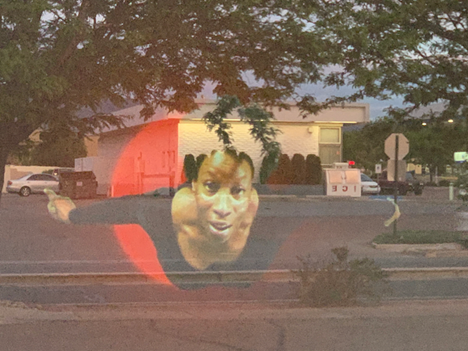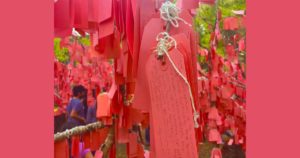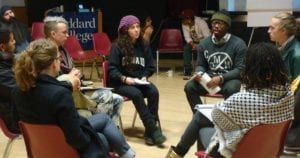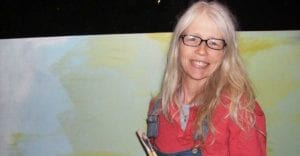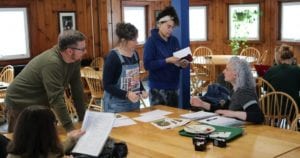 By chance or design, I held the words of the Salvadoran poet Claribel Alegría…
By chance or design, I held the words of the Salvadoran poet Claribel Alegría…
I joined “Tactile Notations” w Jen Bervin (of Silk Poems) as a day student at Haystack Mountain School of Crafts in the last week of June, and I was drawn to the workshop because she meshes science and poetry and allows poems to be sculptural. I wanted to freshen up and I had an instinct that coming at my subjects through visuals, having been a designer / printer in a previous life, could open me up to new approaches for my writing. I let go of any agenda beforehand.
I was, however, frankly, not in very good shape in that last week of June and considered not going, feeling overcome by the news at our border, sleepless with fury over the separation of children and families. In the first working day I made a commitment to make something from my despair and rage, regardless of whatever else I did, without trying to make pretty or control the result. The anger would be given towards transforming energy into some shared meaning.
Because of my printing background, I was thinking about negative/positive images and black and white reversals. I remembered I still had the stored negatives in a giant tube from IXOK AMAR.GO, Central American Women Poets for Peace anthology I published at Granite Press (edited by Zoe Angelsey) in the storage room in my house. I returned each night to my house to sleep, so I had access. I lugged the roll to the door, took a matt knife to the top of the tube in brown paper and cut a 12” swath four layers deep into the shiny black roll. I took the stripped negatives with me down to Deer Isle. Arbitrary, I saw El Salvador in the page header at the top of my cut across the edges of the poems. Who had I cut to bring out with me? By chance or design, I held the words of the Salvadoran poet Claribel Alegría, later translated by poet Carolyn Forche and published by Pittsburgh in Flowers from the Volcano.
As the week progressed, I moved the negatives around my work table and began to assemble downwards, creating a pendant. I dropped the idea of making an accordion book – I wanted nothing that closed but something that would be open and move in space. I took waxed cardboard threaded by double-twined black and white string, Indian ink, amber and tan buttons, and the negatives as tribute to Claribel’s fierce poems. She traced the fertile and bloody ground and praised the two countries that she came from—her history marked by necessary flight, first from Nicaragua, which she described as “her motherland,” and then from El Salvador, the “fatherland,” where she grew up. As the pendant grew vertically in color, texture and word from my pile of assemblages, I realized it would spin, hang and elicit movement – a crossing north to south.
I was working down the bench, aligned with the water’s edge, next to a performance artist, a book maker, an embroiderer and a sculptor and I asked each of them for feedback. And while working in the fab lab on a laser cut for something else, I glimpsed two plywood cut-outs in the scrap pile–a large man’s body leaning down to hold the hand of a small child, and then a repeated reverse cut to get the most possible from the plywood sheet. I took both knowing they would serve my project but without knowing how. The negative of the poem fit inside the man and child outline and I had a center for my piece.
Next I found an obituary from The New York Times for Claribel Alegría who died only a few months ago in February. I now had four sections and allowed the rough thread, gold and black ribbon, wax tracks and buttons to serve as the between, conscious of the stitches turning into horizontal and vertical dividing lines.
I hung the pendant poem by a large timber post to let it sway in the air. I kept asking the others in the workshop where they sensed a need for more. And when they felt an absence, I found a stray bit – – a rouge sandpaper disc and stippled cardboard dripped with wax, rent open like a scar on the brown land – to add to the assemblage. The group helped me see the next needed steps as I crossed and re-crossed lines, added markers, with and without words and let the spiral twist in the wind.
By the tenth day it was done with Claribel’s words as anchor. I asked my benchmate one down, about titling and we landed on a line from Claribel, “Public Exhibition of the Destitute Isn’t Good for People.”
I wanted to give the Poetry Pendant away, so it went into the Haystack scholarship auction, held at the end of every session, and it was my benchmate Cintia who had the winning bid. She took it with her home to California where it could turn in the wind and call out Claribel’s words naming the losses borne in blood across the borders of the Americas. In a Bomb Interview, Alegría spoke of the reluctance among the people of El Salvador, stricken by war and repeatedly cut down by brutal regimes, to talk about the history.
“This refusal to speak about it is transitory,” she said. I wanted to bring her gutsy hope to our borders, once again: “Sooner or later we have to face it. We have to reach inside ourselves, and inside our people, too. It’s a lot of work, but something great is going to come from it. Maybe I will not be alive to see it.” (from NYT Obituary for Claribel Alegría by Neil Genzlinger, 2/8/18)


